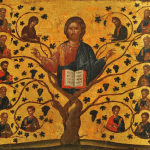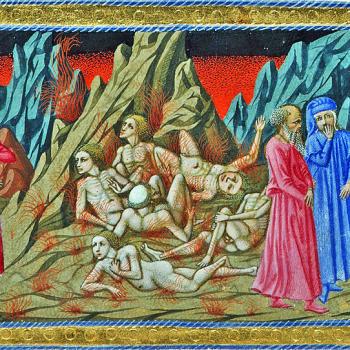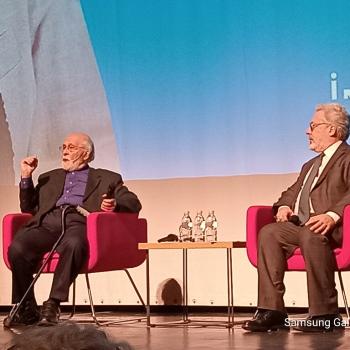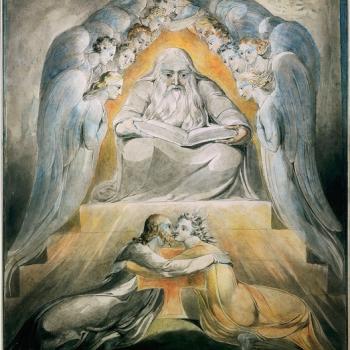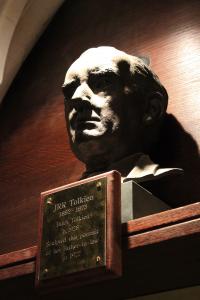
Those who work for and promote the good, those who seek justice in the world, must not knowingly and willingly use evil to fight evil. This is because if they do so, they would slowly be corrupted by the evil they use and replace the evil they fought against with their own evil. This is one of several themes one can find throughout the works of J.R.R. Tolkien. Not only do the ends not justify the means, by embracing evil means, the person who employs that evil will no longer properly seek after and promote the proper good, but instead, they will seek after some lesser good (which, of course, is what evil has us do). The reason why no one should use the Ring against Sauron is that they would only replace Sauron and become the new Dark Lord in his place. The corruption might not be fast; indeed, much good could appear before the evil which lies in it is revealed, but the evil would emerge, and with it, evil would be shown to have been victorious because it would have corrupted and destroyed the good from within, which is a far greater victory for evil than merely having an external victory against the good.
Tolkien understood that those who truly worked for and promoted the good would seek to be consistent with and promote the ideals of the good in all that they did. Evil, if it is not given something to corrupt, something to use up as a kind of fuel, would eventually expend itself and come to an end, and those who worked for the good can then see the good which they have done blossom forth in the world, healing it of the wounds it experienced due to evil. Thus, though evil often appears to be victorious in the world, it is only a limited victory; what lies beyond the tragedy of evil, and all the destruction it brings, is the eucatastrophic ending which will be had by those who supported and worked for the good.
Thus, we see the way in which Manwë dealt with Morgoth, also known as Melkor, was such that he did not, and could not, engage Morgoth in the way Morgoth would have dealt with him. Evil could not overcome evil, for all it would do is replace one evil with another; this is why Manwë had to meet Morgoth’s evil with good, Morgoth’s hate with the dictates of love, and Morgoth’s lies with the truth, even if this appeared to give Morgoth an advantage:
Should Manwë and the Valar meet secrecy with subterfuge, treachery with falsehood, lies with more lies? If Melkor would usurp their rights, should they deny his? Can hate overcome hate? Nay, Manwë was wiser, or being ever open to Eru he did His will, which is more than wisdom. He was even open because he had nothing to conceal, no thought that it was harmful for any to know, if they could comprehend it. Indeed Melkor knew his will without questioning it; and he knew that Manwë was bound by the commands and injunctions of Eru, and would do this or abstain from that in accordance with them, always, even knowing that Melkor would break them as it suited his purpose. Thus the merciless will ever count on mercy, and the liars make use of truth; for if mercy and truth are withheld from the cruel and the lying, they have ceased to be honoured. [1]
Tolkien indicated that if we are to honor mercy and truth, we must truly embrace them, willing to render them to all and not just to those who we think deserve them. Once we stop giving either, or both, to someone, we have ourselves given way against them ourselves and have begun to follow the path of evil, becoming like the one which we oppose:
If Manwë had broken this promise for his own purposes, even though still intending “good”, he would have taken a step upon the paths of Melkor. That is a perilous step. In that hour and act he would have ceased to be the vice-gerent of the One, becoming but a king who takes advantage over a rival whom he has conquered by force. [2]
Intending good, but using an evil means to attain that good, is exactly what leads us along the path to greater and greater evil. For what we have done is see some evil as being good, allowing our own understanding of the good be corrupted. This is exactly what evil does; it corrupts the good, indeed, it is a disordered engagement with the good itself. The more we give in to that disorder, the more we embrace evil, the more we lose ourselves and the good which we once had. Thus, at times, the path of the good is difficult, for evil will encourage us to do things in ways that expediate our desires, but expediting things in such a way comes at too great a cost. Honor, mercy, forgiveness, indeed, the preservation of life, when possible, is necessary if we are not to give in to the sway of evil ourselves. This is why, for example, Gollum could not have been killed by the Elves, even if he “deserved it”:
‘Deserves it! I daresay he does. Many that live deserve death. And some that die deserve life. Can you give it to them? Then do not be too eager to deal out death in judgement. For even the very wise cannot see all ends. I have not much hope that Gollum can be cured before he dies, but there is a chance of it. And he is bound up with the fate of the Ring. My heart tells me that he has some part to play yet, for good or ill, before the end; and when that comes, the pity of Bilbo may rule the fate of many – yours not least. In any case we did not kill him: he is very old and very wretched. The Wood-elves have him in prison, but they treat him with such kindness as they can find in their wise hearts.” [3]
Capital punishment embraces an evil means, for it seeks to destroy the life of someone else, a life which, however corrupted, contains good in and of itself, a good which could be mended and healed. By acting in such a manner, capital punishment embraces the very evil it seeks to eliminate, causing those who embrace it to follow the path of corruption until they become like the ones they executed, or worse. Who deserves death? We are not the ones to judge that; we must work to preserve life, and if someone has been rendered no longer a threat, we cannot argue self-defense as a justification for executing them. If we say a killer should be executed because no one has the authority to take a life, we contradict ourselves, because we say we have the authority to take a life, and so we become just like the killer, with the only difference being in the reasons we give for our death-dealing.
It could be said, and indeed, it is often said, if we allow those who have done great evil to live, we risk their escape, and if they do escape, we are to blame. But this, again, Tolkien considered. It is true, they might escape, they might go out into the world and cause more havoc, and we should do what we legitimately can do to make sure this does not happen; but if it happens, though evil will appear to be victorious for a time, such evil nonetheless will find its victory temporary, and it will eventually exhaust itself in one fashion or another. Tolkien showed this in various ways, among which, the way in which Melkor’s escape eventually led to his greater undoing:
The weakest and most imprudent of all the actions of Manwë, as it seems to many, was the release of Melkor from his captivity. From this came the greatest loss and harm; the death of the Trees, and the exile and anguish of the Noldor. Yet through this suffering there came also, as maybe in no other way could it have come, the victory of the Elder Days: the downfall of Angband and the last overthrow of Melkor. [4]
Similarly, the way in which Gollum escaped and survived allowed him to become the means by which Sauron’s Ring was destroyed. Though Gandalf did not know that this would happen, he sensed that the mercy shown to Gollum by Bilbo and the Elves would lead to some greater good, and that greater good would justify the mercy which was rendered to him. Tolkien also pointed out that those who do evil, but find themselves halted by the good, will also be given the opportunity to repent and change their ways. If this were to happen, they would then be able to work for and help overcome the damage they have done to the world, which would produce a far greater good than what would happen if what had been corrupted by evil found their life extinguished. [5] Thus, Manwë rightfully hoped that even Morgoth had a chance to be saved, because being held captive, he would be prevented from doing evil, allowing him the time to think upon and contemplate his misdeeds:
He was made captive as a punishment for his evil deeds, under the authority of the King. So we may say; but it were better said that he was deprived for a term, fixed by promise, of his power to act, so that he might halt and consider himself, and have thus the only chance that mercy could contrive of repentance and amendment. For the healing of Arda indeed, but for his own healing also. Melkor had the right to exist, and the right to act and use his powers. Manwë had the authority to rule and to order the world, so far as he could, for the well-being of the Eruhuini; but of Melkor would repent and return to the allegiance of Eru, he might be given his freedom again. He could not be enslaved, or denied his part. [6]
While, it is true that many who are imprisoned do not repent and change their ways, certainly there have been many criminals who have indeed become reformed, so that this notion that we should work to preserve criminals and do what we can to promote such reformation is justified. The key is to do what we can to help encourage such a change. Prison should not be is about revenge, for vengeance is in the hands of God, not us. So long as we ignore this, prison will less likely bring about reformation, and those imprisoned, when set free, will not have changed their ways; this is because no one showed them the care and compassion they needed to find themselves redirected and embrace the good they had forsaken; instead, they would have found their ways validated by the system itself. To be sure, many might reject such reformation, no matter how much it is encouraged, and such people will likely be a threat to society all their lives. This is why prison can be and should also be used to keep them separate from society as whole, so that they will not be able to cause much more harm to society (and it would, in theory, also protect them from those in society who would otherwise seek them harm). In doing so, we should always treat those imprisoned with the dignity all humans deserve, for if we deny them that dignity, we become monsters ourselves, showing the evil has not been stopped but only transferred to new inhabitants.
Tolkien understood the way evil worked and corrupted people. He saw not only the way people could and would embrace evil means for some intended good, but how, in that embrace, they would create new, and possibly worse terrors themselves. He also understood the difficulties involved in following the path of the good, that it could and often would appear to be a weakness to do good. He saw that evil could and would often take advantage of that apparent weakness. But he saw that so long as evil did not find new hosts, it would eventually find its host exhausted, and the evil itself will create its own undoing.[7] The good, then preserved, can set about healing the world which had been damaged by such evil, but it could not and would not do so if those who were on the side of the good allowed the ways of evil to corrupt them, for then, instead of healing the world, they would have continued its destruction.
[1] J.R.R. Tolkien, “Ósanwe-Kenta,” in The Nature of Middle Earth. Ed. Carl F. Hostetter (Boston: Houghton Mifflin, 2021), 214-15.
[2] J.R.R. Tolkien, “Ósanwe-Kenta,” 216.
[3] J.R.R. Tolkien, The Fellowship of the Ring in The Lord of the Rings: Collector’s Edition (Boston: Houghton Mifflin Company, 1974; repr: no date listed), 69. Frodo would eventually learn this lesson, for not only does he find himself saving Gollum’s life, he would also seek to preserve Saruman’s life despite all the evil Saruman had done to the Shire.
[4] J.R.R. Tolkien, “Ósanwe-Kenta,” 216.
[5] In this fashion, Tolkien even suggested “Arda” (or the world) healed from the damage done to it by evil would become something greater than it would have been if it had not been marred. See, for example, J.R.R. Tolkien, “The Knowledge of the Valar,” in The Nature of Middle Earth. Ed. Carl F. Hostetter (Boston: Houghton Mifflin, 2021), 233.
[6] J.R.R. Tolkien, “Ósanwe-Kenta,” 215.
[7] At the end of the Lord of the Rings, this is exemplified in the way Frodo granted Saruman mercy, showing he had learned what he did not understand before he had been the Ringbearer. Frodo did what was good, but despite the mercy Frodo showed Saruman, Saruman would not live long, for his corrupted servant, Wormtongue, would kill him, showing that Saruman had created the means for his very destruction.
Stay in touch! Like A Little Bit of Nothing on Facebook.
If you liked what you read, please consider sharing it with your friends and family!



